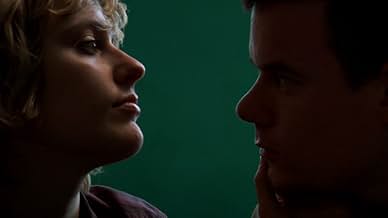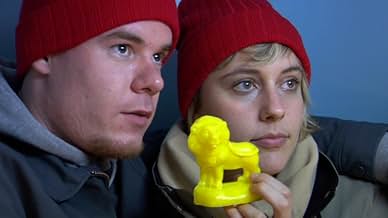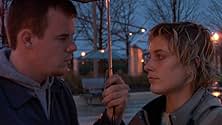IMDb रेटिंग
5.8/10
2 हज़ार
आपकी रेटिंग
अपनी भाषा में प्लॉट जोड़ेंA man and woman must face the tension that builds between them during a long-distance relationship.A man and woman must face the tension that builds between them during a long-distance relationship.A man and woman must face the tension that builds between them during a long-distance relationship.
- निर्देशक
- लेखक
- स्टार
- पुरस्कार
- 2 कुल नामांकन
फ़ीचर्ड समीक्षाएं
The name itself of this school of film-making, "mumblecore," is so despised, the Voice writer, Nick Pinkerton, refused to use it in reviewing this movie and substituted "postgraduate naturalism." That, too, is a put-down ; it suggests mature work is yet to come. But I think maybe we should take this stuff on its own merits and give it credit for being expressive and representative and something new and different, even if it pales in comparison to great cinema. What doesn't? Yes, it's youthful, and in some ways unambitious. Isn't that an expression of the zeitgeist? It is valid in its own way and this is a good example of it, unlike others.
'Night and Weekends' purports to depict in a naturalistic but highly selective style a year and a half of the long-distance relationship of a semi-fictional 20-something couple. They are James and Mattie, and they are played by the filmmakers, Joe Swanberg and Greta Gerwig, respectively.
Reading reviews of this movie when you're wondering if you want to see it can be horrifying. Some of the notices are favorable and even affectionate, but the many that aren't are absolutely excoriating. One enters the auditorium with grave doubts. But in hindsight it's almost encouraging the way the critics attack the protagonists as people, finding them jejune, self-absorbed, uninteresting, etc. Whether that means Swanberg and Gerwig have put it across--or only that nobody believes in the fiction that they're being anyone but just themselves--may not even mater. But such reactions show how difficult it is for some to judge such a film. 'Nights and Weekends' is neither documentary nor fiction, nor yet quite a clever blending of the two. There's hardly much detachment when two filmmakers are shooting themselves up close almost exclusively in relation to each other. They're guilty of intimacy, even if it's staged. They're guilty of taking a long look at themselves, even though they scarcely know who they are. But where this movie succeeds is in evanescent moments of raw, scarcely defined feeling.
Some of the other films of this school feature more numerous casts of less good-looking people and more talk. Swanberg and Gerwig are a presentable couple, depicted in bright color with good lighting. In this not unpleasant but not very atmospheric format the movie shows their out of town sojourns, sex, posing in mirrors, experimentation with a pay photo booth--and their conversations, which, judged by literary standards appear to involve a range of ideas from A to B and a 200-word vocabulary. He's tall, solid, puckish, chin-whiskered; she's a cute, insecure bottle blond with a nice smile and tons of self-absorption to go with her occupation: writer. Together, with minimal narrative and limited dialogue, their surfaces depict them as a life-size Ken and Barbie who talk like young 21st century white middle class Americans. He has designed some kind of video game software that's depicted as having a good future.
Clearly Swanberg and Gerwig have something going on that's not acting. They do a lot of kissing; his is particularly sweet and spontaneous. And they do some screwing, which is more spontaneous than erotic. But they've made a movie out of this. It's not "them." Is the pouting and fighting? Are the filmmakers a real couple--or former couple? Is the real couple's relationship ending, or is this a foreshadowing of its ending, a 'what if'? But the encounters aren't intense enough to make one worry one way or the other. And that's okay, because what one gets is contemporary relationship texture. The feel of the everyday.
How "real" and how invented the scenes are is unknowable. The movie opens with apparently successful sex when she arrives in Chicago (they strip each other fast on the floor; he's visibly aroused). At the end they're in his hotel room in Manhattan where he's come for some kind of job thing and the sex fizzles. Scenes fade to voice-over, cut to slip forward in time to a new place and time and obviously the cutting governs the audience's sense of the relationship and the people.
Critics have found this effort notably unworthy of comparison with Cassavetes. But Cassavetes' naturalistic, improvised classics, with their much more elaborate narratives and back-stories and their much more self-conscious and actor-y performances, are something entirely different anyway. 'Nights and Weekends' has qualities other films don't have. But they also have none of the poetry and cinema allusion of the Nouvelle Vague, nor the control and elegance of true minimalism: this time cutting doesn't mean calculation, structure, hardly even editing, though it does mean controlling what we get to see of the couple's interactions.
And maybe what they all mean is this:
The relationship won't last. As Mattie says in one speech, they have to do something. She doesn't say it, but one of them must move. Since he has business in New York, that might be Joe. But since things go awkwardly on their last, New York, meeting, maybe it's just going to end. The ending leaves us hanging. It's just another raw cut. No poetry, no finality, just a few tears.
Yet some viewers when I attended were audibly very pleased and found much of the happenings on screen funny and true.
My first reaction with mumblecore is a sigh of relief--it's not so bad; it could have been worse. Cassavetes' films, however much richer, can be tedious and painful watching and nothing seems more theatrical than actors being naturalistic. Swanberg and Gerwig are scarcely actors. They're just two people good at ignoring the camera even when it's right in their faces. They're more like 'models,' which is what porn filmmakers call their actors. Reservations and condescension aside, though, this movie conveys some of the most raw and essential aspects of living in a long-distance relationship that I've ever seen. Ken and Barbie are an Everyman and Everywoman for this painful and and frustrating and sometimes beautiful experience.
'Night and Weekends' purports to depict in a naturalistic but highly selective style a year and a half of the long-distance relationship of a semi-fictional 20-something couple. They are James and Mattie, and they are played by the filmmakers, Joe Swanberg and Greta Gerwig, respectively.
Reading reviews of this movie when you're wondering if you want to see it can be horrifying. Some of the notices are favorable and even affectionate, but the many that aren't are absolutely excoriating. One enters the auditorium with grave doubts. But in hindsight it's almost encouraging the way the critics attack the protagonists as people, finding them jejune, self-absorbed, uninteresting, etc. Whether that means Swanberg and Gerwig have put it across--or only that nobody believes in the fiction that they're being anyone but just themselves--may not even mater. But such reactions show how difficult it is for some to judge such a film. 'Nights and Weekends' is neither documentary nor fiction, nor yet quite a clever blending of the two. There's hardly much detachment when two filmmakers are shooting themselves up close almost exclusively in relation to each other. They're guilty of intimacy, even if it's staged. They're guilty of taking a long look at themselves, even though they scarcely know who they are. But where this movie succeeds is in evanescent moments of raw, scarcely defined feeling.
Some of the other films of this school feature more numerous casts of less good-looking people and more talk. Swanberg and Gerwig are a presentable couple, depicted in bright color with good lighting. In this not unpleasant but not very atmospheric format the movie shows their out of town sojourns, sex, posing in mirrors, experimentation with a pay photo booth--and their conversations, which, judged by literary standards appear to involve a range of ideas from A to B and a 200-word vocabulary. He's tall, solid, puckish, chin-whiskered; she's a cute, insecure bottle blond with a nice smile and tons of self-absorption to go with her occupation: writer. Together, with minimal narrative and limited dialogue, their surfaces depict them as a life-size Ken and Barbie who talk like young 21st century white middle class Americans. He has designed some kind of video game software that's depicted as having a good future.
Clearly Swanberg and Gerwig have something going on that's not acting. They do a lot of kissing; his is particularly sweet and spontaneous. And they do some screwing, which is more spontaneous than erotic. But they've made a movie out of this. It's not "them." Is the pouting and fighting? Are the filmmakers a real couple--or former couple? Is the real couple's relationship ending, or is this a foreshadowing of its ending, a 'what if'? But the encounters aren't intense enough to make one worry one way or the other. And that's okay, because what one gets is contemporary relationship texture. The feel of the everyday.
How "real" and how invented the scenes are is unknowable. The movie opens with apparently successful sex when she arrives in Chicago (they strip each other fast on the floor; he's visibly aroused). At the end they're in his hotel room in Manhattan where he's come for some kind of job thing and the sex fizzles. Scenes fade to voice-over, cut to slip forward in time to a new place and time and obviously the cutting governs the audience's sense of the relationship and the people.
Critics have found this effort notably unworthy of comparison with Cassavetes. But Cassavetes' naturalistic, improvised classics, with their much more elaborate narratives and back-stories and their much more self-conscious and actor-y performances, are something entirely different anyway. 'Nights and Weekends' has qualities other films don't have. But they also have none of the poetry and cinema allusion of the Nouvelle Vague, nor the control and elegance of true minimalism: this time cutting doesn't mean calculation, structure, hardly even editing, though it does mean controlling what we get to see of the couple's interactions.
And maybe what they all mean is this:
The relationship won't last. As Mattie says in one speech, they have to do something. She doesn't say it, but one of them must move. Since he has business in New York, that might be Joe. But since things go awkwardly on their last, New York, meeting, maybe it's just going to end. The ending leaves us hanging. It's just another raw cut. No poetry, no finality, just a few tears.
Yet some viewers when I attended were audibly very pleased and found much of the happenings on screen funny and true.
My first reaction with mumblecore is a sigh of relief--it's not so bad; it could have been worse. Cassavetes' films, however much richer, can be tedious and painful watching and nothing seems more theatrical than actors being naturalistic. Swanberg and Gerwig are scarcely actors. They're just two people good at ignoring the camera even when it's right in their faces. They're more like 'models,' which is what porn filmmakers call their actors. Reservations and condescension aside, though, this movie conveys some of the most raw and essential aspects of living in a long-distance relationship that I've ever seen. Ken and Barbie are an Everyman and Everywoman for this painful and and frustrating and sometimes beautiful experience.
Some time ago I gave up on Swanberg. He can do a 20 minutes story well. When it comes to 90 minutes, it's the same 20 minutes and a lot of air.
Gerwig is nice. She acts well. But there is not much of a story she can work on. In fact, there is no story, only a chronological succession of snapshots that start nowhere and end up somewhere.
Gerwig is nice. She acts well. But there is not much of a story she can work on. In fact, there is no story, only a chronological succession of snapshots that start nowhere and end up somewhere.
This mumblecore drama is shot in the style of a homemade movie and takes a close (at times too close) look at Mattie, who resides in The City That Never Sleeps, and James, who resides in The Windy City, a fun-loving, hot and heavy young couple and the severe strain they face while trying to hold onto their passionate but unsustainable long-distance relationship. Will they prevail, or is their steamy love affair already kaput? The low-budget filmmaking style does create a welcomed sense of spontaneity that makes the characters and dialogue feel authentic, plus it really allows the two central actors to embody most of the awkwardness and complexities between the two of them, but still it's not very deep or profound, nor does it have a true plot to propel the scenes forward, thus making it feel like a prolonged and gratuitous exercise despite the relatively short running time. **
Nights and Weekends - I was surprised by how much I liked this one. in fact it may be one of the better mumblecore movies I've seen. That doesn't mean it's anything 'great' but as far as slice of life films go it really makes a valiant and honest attempt to just show a couple as they are. The whole long-distance relationship angle makes the story kind of doomed from the get-go, or at least once one sees Mattie (Gerwig) get bitchy at James (Swanberg) over how much effort has to be put in to going from NY to Chicago and back again just to have a relationship. But what I liked this time, unlike, say, Swanberg's previous film Hannah Takes the Stairs is that there is also effort to tell a story, if only evidenced by the whole 'cutting ahead to one-year-later', and showing some set-up and payoff with a couple of things and items like a lion.
The two actors are natural, and why not? I have to think they were close enough to bare themselves to themselves (physically and mentally, mostly physically), and it works for the benefit of the naturalism. A few scenes get bogged down so much in minutae that you want things to move on, but what I liked here was that, for me at least, the stripping to the little moments made their relationship palpable, and cute, and kind of sad all at the same time. When we see Gerwig cry, we know the tears are genuine, as is Swanberg's awkwardness at keeping the relationship going, such as when he has a photo shoot and asks her to come.
Why to watch it? Simply put, it's a romantic dramedy for those looking for a solid alternative to pap and crap from Hollywood. It's so decidedly un-Hollywood it does come close to the other direction of being too precious. But only close, not all the way. It's got two actors completely at ease and open to taking their characters totally where they need to go without any BS, and as directors they keep things moving so it's never *too* boring. Some may disagree, and that's well and good, since it is still firmly in the 'mumblecore' vein. At the right moment in time, Nights and Weekends connected with me, and hopefully it may with a few others.
The two actors are natural, and why not? I have to think they were close enough to bare themselves to themselves (physically and mentally, mostly physically), and it works for the benefit of the naturalism. A few scenes get bogged down so much in minutae that you want things to move on, but what I liked here was that, for me at least, the stripping to the little moments made their relationship palpable, and cute, and kind of sad all at the same time. When we see Gerwig cry, we know the tears are genuine, as is Swanberg's awkwardness at keeping the relationship going, such as when he has a photo shoot and asks her to come.
Why to watch it? Simply put, it's a romantic dramedy for those looking for a solid alternative to pap and crap from Hollywood. It's so decidedly un-Hollywood it does come close to the other direction of being too precious. But only close, not all the way. It's got two actors completely at ease and open to taking their characters totally where they need to go without any BS, and as directors they keep things moving so it's never *too* boring. Some may disagree, and that's well and good, since it is still firmly in the 'mumblecore' vein. At the right moment in time, Nights and Weekends connected with me, and hopefully it may with a few others.
The film is shot like a home made video, characters very realistic . The lead characters maintain a long distance relationship or try to , the film does not try to spice up moments . But there is one thing I would like to know.Is Joe Swanberg made to act bad as the script or is he a bad actor?, have not seen any of his films. If the first is true, as in the script defines his acting , then the film is plot less because a girl like Greta would not be thinking twice about holding a relationship with that character, even from 10 miles apart.Greta is vulnerable, with mood swings portrayed brilliantly as she always does, wonder the intimate scenes cold have been more passionate as they meet only after a while each time.
क्या आपको पता है
- ट्रिवियाGreta Gerwig admitted in interviews that the film was a difficult experience for her. Gerwig indicates that she and Joe Swanberg got into a number of quarrels over the film and did not speak to each other for three months. In fact, during production, the entire tone of the film shifted from the original plan of making a "happy" film to something much more complicated.
- कनेक्शनReferenced in Diminishing Returns: Oscars 2020 (2020)
टॉप पसंद
रेटिंग देने के लिए साइन-इन करें और वैयक्तिकृत सुझावों के लिए वॉचलिस्ट करें
- How long is Nights and Weekends?Alexa द्वारा संचालित
विवरण
बॉक्स ऑफ़िस
- US और कनाडा में सकल
- $5,430
- US और कनाडा में पहले सप्ताह में कुल कमाई
- $2,902
- 12 अक्तू॰ 2008
- दुनिया भर में सकल
- $5,430
- चलने की अवधि1 घंटा 20 मिनट
- रंग
- ध्वनि मिश्रण
- पक्ष अनुपात
- 1.85 : 1
इस पेज में योगदान दें
किसी बदलाव का सुझाव दें या अनुपलब्ध कॉन्टेंट जोड़ें





















